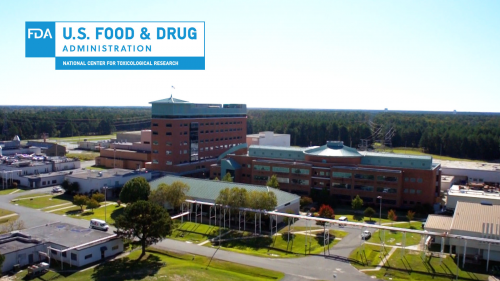FDA’s National Center for Toxicological Research Celebrates Half a Century of Cutting-Edge Research

By: William Slikker, Jr., Ph.D., National Center for Toxicological Research Director and RADM Denise Hinton, Chief Scientist
The U.S. Food and Drug Administration is responsible for regulating products Americans use every day. From your toothbrush and moisturizer to your morning coffee, and the food you buy your pet, to your annual flu shot, the FDA regulates or oversees them all. To ensure the safety of these products, which account for about 20 cents of every dollar spent by U.S. consumers, the FDA’s decisions must be based on sound regulatory science.
Regulatory science research enables the FDA to understand and assess risk and helps ensure the safety—or reduce the harm—of the products it regulates. In 1971, President Nixon established the National Center for Toxicological Research (NCTR), now part of the FDA Office of the Chief Scientist, in Arkansas as the sole research center for the FDA. This year the center is celebrating 50 years of scientific achievements including the groundbreaking research we have done—and continue to do—in support of the FDA’s regulatory centers.
Our research provides data to identify how agents interact with the body to cause toxicity, which lead to guidances for industry and help us better understand the biochemical reactions to cancer-causing substances, for example. Most recently, NCTR scientists developed a method to detect the virus that causes COVID-19 in wastewater, yielding important data to support the COVID-19 response. Because individuals shed the virus in their feces, wastewater surveillance warns of its increased circulation in a community. This complements individual testing to give a faster snapshot of viral spread in a population.
Advancing Research in Pediatric and Maternal Health
As described in recent FDA Voices, the impact of FDA-regulated product use during the perinatal period, including pregnancy, needs to be better understood. Maternal and perinatal research has long been a cornerstone of NCTR’s research, producing significant outcomes, such as closing knowledge gaps in the understanding of pediatric anesthetic use and their safe use in children. NCTR’s research on pediatric anesthetics led to several FDA drug-safety communications, like the change in label requirements for general anesthetics and sedatives used in young children. The changes include a warning about cumulative exposures over several surgeries, as well as one-time exposures of more than three hours that may affect the developing brain. To further advance research and generate data on these understudied populations, in 2018, NCTR established the FDA Perinatal Health Center of Excellence to fund and manage studies across the FDA.
Genomic Technology and Bioinformatics
Since NCTR’s establishment, the pace of scientific advancements has accelerated at breakneck speed. Novel technologies that use genetic information to provide individualized therapies have increased the demand for more studies in this area. With NCTR leadership, the FDA formed large teams of scientists from public and private entities to discuss the best scientific practices for using genomic technology. NCTR scientists developed bioinformatic tools to store, manage, and analyze large quantities of genomic and other scientific data that are generated by new technologies.
Another rapidly evolving technology is nanotechnology. Recognizing the growing use of these nano-sized materials (billionths of a meter) in FDA-regulated products, NCTR established the NanoCore in collaboration with the FDA’s Office of Regulatory Affairs. Research from the NanoCore keeps the FDA and other agencies apprised of the toxicity and safety of nanotechnology-based materials. NCTR also co-chairs the FDA Nanotechnology Task Force that identifies and recommends ways to address any knowledge or policy gaps that exist within the nanotechnology research community.
Preparing for the Future
As science and technology have swiftly evolved, so too has our globalized economy with an ever-increasing volume of FDA-regulated products imported from abroad. The COVID-19 pandemic and the worldwide race to develop a vaccine has proved we are truly part of a global scientific community. NCTR has assumed a leadership role in that community, engaging with our regulatory counterparts and scientists on the world stage. In 2013, NCTR co-led the establishment of the Global Coalition for Regulatory Science Research. This coalition comprises international regulatory science leaders and sponsors an annual Global Summit on Regulatory Science, also established under NCTR leadership. The Global Summit provides training and enhances global cooperation to improve public health in U.S. and around the globe.
NCTR’s research priorities have always evolved with the agency’s over time. We have ensured that our research portfolio going forward includes focus areas of regulatory science identified in 2021. Specifically, we realize the major influence that artificial intelligence (AI) will have on regulations in the coming years and that AI has become an ever-increasing part of almost all areas of research. As a result, NCTR is vested in AI research for personalized therapeutics, early disease detection, smarter food safety, and studying emerging infectious diseases like COVID-19—supporting all four FDA strategic initiatives.
Given its reputation, NCTR is often sought as a leader, collaborator, and advisor in the international research community. This network enables NCTR and its collaborators to benefit from one another’s expertise. At its recent 50th Anniversary celebration, NCTR acknowledged its many partners, including the Arkansas Research Alliance and the state of Arkansas. These partnerships have been essential to NCTR’s past accomplishments, as they will be for our future goals. Most important to all our research efforts, however, is our dedicated scientific staff, who have secured the past and guarantee the future successes of NCTR in protecting and promoting public health.


